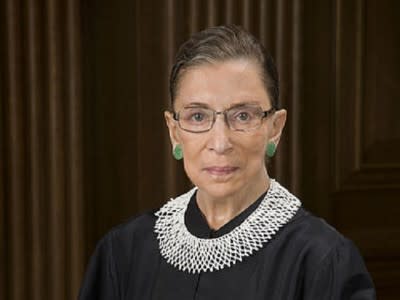10 big quotes from today’s Supreme Court Obamacare decision
On Monday, a divided Supreme Court said closely held companies can opt out from part of Obamacare. Here are the decision highlights from three Justices: Samuel Alito, Anthony Kennedy and Ruth Bader Ginsburg.
Justice Ruth Bader Ginsburg
The 95-page decision in Burwell v. Hobby Lobby Stores was dominated by Alito’s majority opinion and Ginsburg’s impassioned dissent. Kennedy also wrote a concurring opinion that addressed a few specific points.
In the 5-4 decision, Alito said the closely held corporations cannot be required to provide contraception coverage under Obamacare if they voiced religious objections under the federal Religious Freedom Restoration Act (RFRA).
In Alito’s majority opinion, in which he was joined by Chief Justice John Roberts, Antonin Scalia, Kennedy and Clarence Thomas, he said the exceptions only apply to the Affordable Care Act’s contraception mandate for closely held companies, which have five or fewer shareholders.
Ginsburg strongly disagreed with that premise, calling the decision one of “startling breadth,” an idea rejected by Alito and Kennedy. Ginsburg was joined by Stephen Breyer, Sonia Stotomayor and Elena Kagan in her dissent.
Here are some of most relevant from the decision, which can be read at: http://blog.constitutioncenter.org/2014/06/link-read-the-entire-2014-obamacare-supreme-court-decision/
Alito
“We do not hold, as the principal dissent alleges, that for-profit corporations and other commercial enterprises can ‘opt out of any law (saving only tax laws) they judge incompatible with their sincerely held religious beliefs.’”
Alito
“Nor do we hold, as the dissent implies, that such corporations have free rein to take steps that impose ‘disadvantages . . . on others’ or that require ‘the general public [to] pick up the tab.’”
Alito
“The effect of the HHS-created accommodation on the women employed by Hobby Lobby and the other companies involved in these cases would be precisely zero. Under that accommodation, these women would still be entitled to all FDA-approved contraceptives without cost sharing.”
Alito
“Congress provided protection for people like the Hahns and Greens by employing a familiar legal fiction: It included corporations within RFRA’s definition of ‘persons.’ But it is important to keep in mind that the purpose of this fiction is to provide protection for human beings.”
Kennedy
“At the outset it should be said that the Court’s opinion does not have the breadth and sweep ascribed to it by the respectful and powerful dissent.”
Kennedy
“Among the reasons the United States is so open, so tolerant, and so free is that no person may be restricted or demeaned by government in exercising his or her religion. Yet neither may that same exercise unduly restrict other persons, such as employees, in protecting their own interests, interests the law deems compelling. “
Ginsburg
“In a decision of startling breadth, the Court holds that commercial enterprises, including corporations, along with partnerships and sole proprietorships, can opt out of any law (saving only tax laws) they judge incompatible with their sincerely held religious beliefs.”
Ginsburg
“In the Court’s view, RFRA demands accommodation of a for-profit corporation’s religious beliefs no matter the impact that accommodation may have on third parties who do not share the corporation owners’ religious faith—in these cases, thousands of women employed by Hobby Lobby and Conestoga or dependents of persons those corporations employ. Persuaded that Congress enacted RFRA to serve a far less radical purpose, and mindful of the havoc the Court’s judgment can introduce, I dissent.”
Ginsburg
“And where is the stopping point to the ‘let the government pay’ alternative? Suppose an employer’s sincerely held religious belief is offended by health coverage of vaccines, or paying the minimum wage or according women equal pay for substantially similar work. Does it rank as a less restrictive alternative to require the government to provide the money or benefit to which the employer has a religion-based objection?”
Ginsburg
“The Court, I fear has ventured into a minefield, by its immoderate reading of RFRA. I would confine religious exemptions under that Act to organizations formed ‘for a religious purpose,’ ‘engage[d] primarily in carrying out that religious purpose,’ and not ‘engaged. . . substantially in the exchange of goods or services for money beyond nominal amounts.’”
Recent Stories on Constitution Daily
Supreme Court rules in Obamacare challenge case


